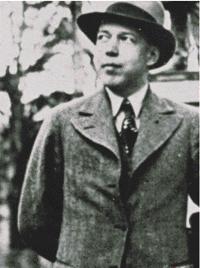Mika Waltari
| Mika Waltari | |
|---|---|

Mika Waltari
|
|
| Born |
19 September 1908 Helsinki, Grand Duchy of Finland |
| Died | 26 August 1979 (aged 70) Helsinki, Finland |
| Occupation | Author, translator, academician |
| Nationality | Finnish |
| Literary movement | Tulenkantajat |
Mika Toimi Waltari (![]() pronunciation ) (19 September 1908 – 26 August 1979) was a Finnish writer, best known for his best-selling novel The Egyptian (Finnish: Sinuhe egyptiläinen). He was extremely productive, and wrote in addition to novels also poetry, short stories, criminal novels, plays, essays, travel stories, film scripts and rhymed texts for comic strips.
pronunciation ) (19 September 1908 – 26 August 1979) was a Finnish writer, best known for his best-selling novel The Egyptian (Finnish: Sinuhe egyptiläinen). He was extremely productive, and wrote in addition to novels also poetry, short stories, criminal novels, plays, essays, travel stories, film scripts and rhymed texts for comic strips.
Waltari was born in Helsinki and lost his father, a Lutheran pastor, at the age of five. As a boy, he witnessed the Finnish Civil War in Helsinki. Later he enrolled in the University of Helsinki as a theology student, according to his mother's wishes, but soon abandoned theology in favour of philosophy, aesthetics and literature, graduating in 1929. While studying, he contributed to various magazines and wrote poetry and stories, getting his first book published in 1925. In 1927 he went to Paris where he wrote his first major novel Suuri illusioni ('The Grand Illusion'), a story of bohemian life. In terms of style, the novel is considered to be the Finnish equivalent to the works of the American writers of the Lost Generation. (In Waltari's historical novel The Adventurer, taking place in the 16th century, the hero is a Finn who wanders through Europe meeting many important characters of the time and ends up in Constantinopole working for the Ottoman Empire). Waltari also was, for a while, a member of the liberal literary movement Tulenkantajat, though his political and social views later turned conservative. He was married in 1931 and had a daughter, Satu, who also became a writer.
...
Wikipedia
